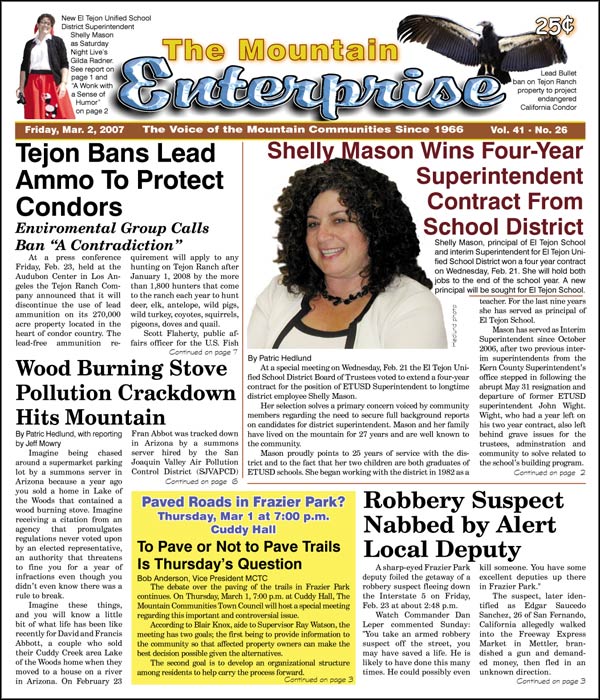Environmental Group Calls Ban "A Contradiction"
At a press conference Friday, Feb. 23, held at the Audubon Center in Los Angeles the Tejon Ranch Company announced that it will discontinue the use of lead ammunition on its 270,000 acre property located in the heart of condor country. The lead-free ammunition requirement will apply to any hunting on Tejon Ranch after January 1, 2008 by the more than 1,800 hunters that come to the ranch each year to hunt deer, elk, antelope, wild pigs, wild turkey, coyotes, squirrels, pigeons, doves and quail.
Scott Flaherty, public affairs officer for the U.S. Fish and Wildlife Service, said in an interview, "This is the largest pro-conservation effort for the condor in years. We do not want hunters to see this as an anti-hunter decision. It is a pro-condor decision."
Condor historically forage and roost in the area encompassed by the ranch.
Use of nonlead ammunition is not new. It became universal nearly a decade ago among hunters for water fowl in the United States. "That rule was enacted because hunters realized it was for the benefit of wildlife and the hunters themselves. Recent studies show that when lead ammunition fragments, it also ends up in the meat that hunters take home to their families" Flaherty said, "It is not a secret that lead is a toxin, we’ve taken it out of paint, toys and gasoline to get safer homes and a cleaner environment."
Tejon Ranch is home to the state’s largest private hunting program. While progress has been made in bringing the condor back from the brink of extinction, poisoning from lead ammunition is regarded as the single greatest threat to the continued recovery of the California Condor. Lead ammunition poses a threat to the condors when the birds eat carrion containing the bullet fragments.
This is the first major private wildlife management program in the state to voluntarily require the use of non-lead ammunition. It covers all lead ammunition used in hunting.
Robert Risebrough, an Environmental Toxicologist and a retired member of Condor Recovery Team, coordinated research on contaminants that endanger condors. Research at the University of California at Santa Cruz was recently reported in the Journal of the American Chemical Society isolating lead isotopes to analyze carcasses of condors that have been returned to the wild but died. Lead poisoning seems to be be a factor in a significant number of those deaths as the condor still teeters on the brink of extinction.
"Twenty-five years ago the world’s population of California Condors was only 23 birds," said Steve Thompson, Regional Director of the U.S. Fish and Wildlife Service. "Today, through the efforts of many, 70 condors fly freely above California. Today’s historic decision by Tejon Ranch to eliminate lead from its hunting program is a major step forward in our efforts to recover this magnificent bird."
Tejon Ranch Company worked closely with the U.S. Fish and Wildlife Service, California Department of Fish and Game, Audubon California and several hunting and environmental organizations to design the new regulation.
"Tejon’s actions today not only protect the California Condor from lead ammunition poisoning on the Ranch, but also demonstrate statewide that hunting and the protection of endangered species can go hand-in-hand," said Joel Reynolds, Senior Attorney and Director of the Natural Resources Defense Council’s Urban Program. NRDC applauds Tejon for its leadership on this issue, and we urge the State of California to take similar common sense action to protect this unique and highly endangered bird throughout its territory."
"Requiring non-lead ammunition is the next step in Tejon Ranch’s ongoing efforts to protect the California Condor, which started in the early 1980s when the Condor Recovery Team used TRC land to capture some of the last remaining condors for the captive breeding program," said Robert A. Stine, President and Chief Executive Officer of Tejon Ranch Company.
"We have a 170-year history of stewardship…which means when we learn a better way to manage our land’s resources, we adapt. New studies make the risk imposed by lead ammunition very evident, so we decided to take the lead on this issue and discontinue the use of lead ammo on Tejon Ranch."
The requirement to use non-lead ammunition will go into affect with the start of the 2008 hunting season, which will allow hunters time to obtain and test nonlead alternatives, TRC releases said. "From that point forward, all hunters allowed on the property through Tejon Ranch’s Wildlife Management Programs will be required to certify that they are using only non-lead ammunition; violators will be banned from hunting on the property."
Jeff Miller with the Center for Biological Diversity said, "We applaud Tejon Ranch’s decision to get the lead out for condors, and if the state’s largest private landholder can go lead-free, then the rest of California should be able to follow suit."
"Unfortunately," Miller continued, "the urban-sprawl developments planned for Tejon Ranch are also a gun to the head of condor recovery efforts. If Tejon pulls the trigger on these developments the resulting habitat destruction and disturbance could prove just as lethal to condors as any bullet."
"Eliminating lead bullets is a step in the right direction, but Tejon is poised to take several steps backward with developments that will destroy the unique values and ecological integrity of Tejon Ranch," said Center biologist Ileene Anderson. "Tejon’s proposed 28,500 acre Tejon Mountain Village will devastate the heart of the condor’s critical habitat."
The Center’s press release on the ban notes that they are part of a "coalition of health and conservation organizations, hunters and American Indians that filed a lawsuit against the state last fall for continuing to allow hunting with toxic lead ammunition."
"Safe, reliable bullets and shot made from copper and other materials are widely available for hunting and perform as well or better than lead ammunition," the group states, adding that the California Fish and Game Commission began a review of the state gamehunting regulations last month and is considering amendments to eliminate lead ammunition, either within the condor range or statewide. The commission will take public comments through April.
"The public has made a tremendous effort to recover the condor and has invested over $40 million in the condor reintroduction program; it makes no sense to allow a private company to destroy the species’ core habitat," Miller summarized.
—Reported by Patric Hedlund
This is part of the March 02, 2007 online edition of The Mountain Enterprise.
Have an opinion on this matter? We'd like to hear from you.


